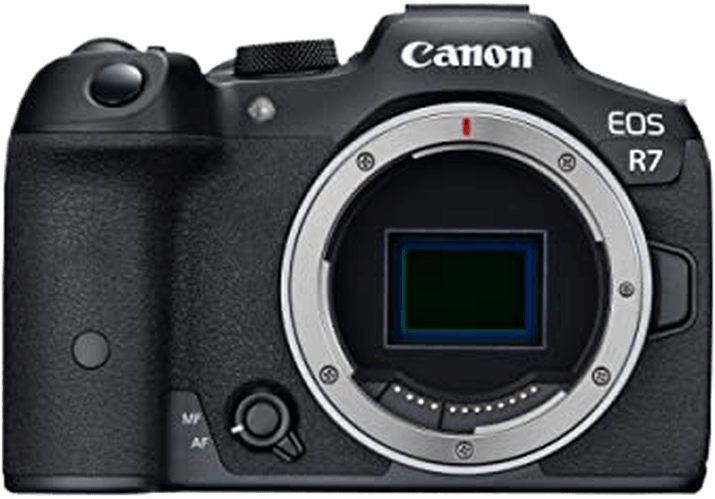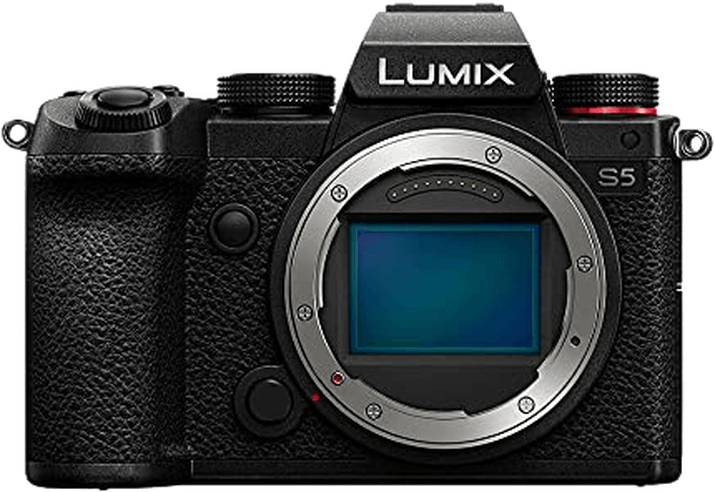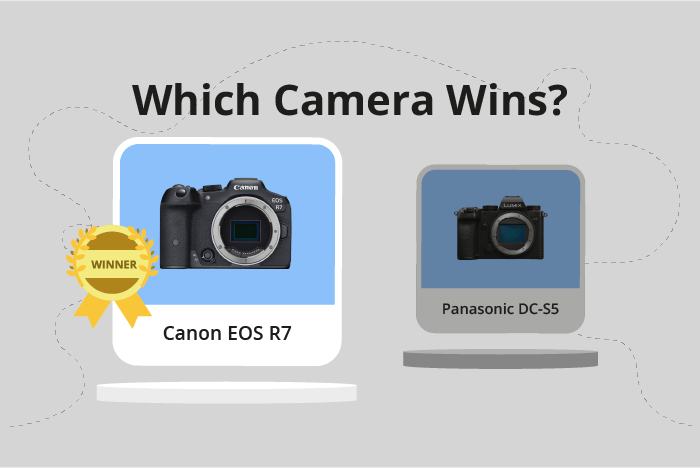Canon EOS R7 vs Panasonic Lumix DC-S5 Comparison
Canon EOS R7

Panasonic Lumix DC-S5

The Canon EOS R7 takes the lead with a score of 83/100, while the Panasonic Lumix DC-S5 trails slightly behind at 79/100. Both cameras share similarities as they are mirrorless and were released in the 2020s. However, the EOS R7 has some advantages, such as being lighter at 612g (1.35lbs) and more compact with dimensions of 132 x 90 x 92mm. Additionally, it has a lower launch price of $1500 compared to the DC-S5’s $1999.
On the other hand, the Lumix DC-S5 has its own merits, even though it is heavier at 714g (1.57lbs) and larger with dimensions of 133 x 97 x 82mm. It was released earlier in 2021, giving it a longer presence in the market.
Taking these factors into account, the Canon EOS R7 offers better value and portability, while the Panasonic Lumix DC-S5 provides an alternative option for those who prioritize an earlier release date.
Canon EOS R7 vs Panasonic Lumix DC-S5 Overview and Optics
The Canon EOS R7 wins in optics, scoring 82/100, while the Panasonic Lumix DC-S5 earns a score of 78/100. Both cameras have several specifications in common, such as CMOS sensors, image stabilization, and processors designed for efficient performance. However, the Canon EOS R7 outperforms the Panasonic Lumix DC-S5 in several aspects, while the latter has a few advantages of its own.
The Canon EOS R7 boasts a higher megapixel count at 33, compared to the Panasonic Lumix DC-S5’s 24.2 megapixels. This difference allows the EOS R7 to produce sharper, more detailed images. Additionally, the EOS R7’s shooting speed of 15 is more than double the Lumix DC-S5’s 7, enabling faster image capture for action and sports photography. Furthermore, the EOS R7 has a higher DXOMARK score for its sensor at 97, compared to the Lumix DC-S5’s 94, indicating better overall sensor performance.
On the other hand, the Panasonic Lumix DC-S5 features a full-frame sensor, which surpasses the Canon EOS R7’s APS-C sensor in terms of image quality and low-light performance. The Lumix DC-S5 also has the advantage of a Leica L lens mount, offering compatibility with a wide range of high-quality lenses.
Despite the Canon EOS R7’s higher score, the Panasonic Lumix DC-S5 remains a strong contender in optics, particularly for users prioritizing full-frame sensor benefits and lens versatility. However, the EOS R7’s advantages in megapixels, shooting speed, and sensor performance make it a more compelling choice for those seeking superior image quality and faster capture capabilities.
Canon EOS R7 vs Panasonic Lumix DC-S5 Video Performance
The Canon EOS R7 outperforms the Panasonic Lumix DC-S5 in video capabilities with a score of 91/100, while the Panasonic Lumix DC-S5 scores 83/100. Both cameras share some common specifications, including a maximum video resolution of 4K and dimensions of 3840 x 2160. Additionally, they both have built-in time-lapse functionality.
The Canon EOS R7 offers superior performance due to its higher maximum video frame rate of 120fps, compared to the Panasonic Lumix DC-S5’s 60fps. This allows the Canon EOS R7 to capture smoother and more detailed slow-motion footage, providing users with greater flexibility and creative possibilities in their video projects.
While the Panasonic Lumix DC-S5 falls short in terms of maximum video frame rate, it remains a solid choice for video enthusiasts. The 60fps frame rate is still capable of producing high-quality footage, and the built-in time-lapse functionality adds versatility to the camera’s capabilities.
Comparing the two cameras, the Canon EOS R7 emerges as the stronger option for video creators due to its higher video score and superior maximum video frame rate. The Panasonic Lumix DC-S5, while not as impressive in this aspect, remains a viable choice for those seeking a reliable camera with 4K video resolution and time-lapse functionality. Ultimately, the choice between these two cameras will depend on the specific needs and preferences of the user, but the Canon EOS R7 is the clear winner in terms of video capabilities.
Canon EOS R7 vs Panasonic Lumix DC-S5 Features and Benefits
The Canon EOS R7 and Panasonic Lumix DC-S5 both have a feature score of 85/100, making it a tie in this comparison. These cameras share several common specifications that contribute to their identical scores. Both cameras have a 3-inch screen size, a touchscreen, a flip screen, and lack GPS. Additionally, both cameras come equipped with WIFI and Bluetooth capabilities.
The Canon EOS R7 has a screen resolution of 1,620,000 dots, while the Panasonic Lumix DC-S5 has a slightly higher screen resolution of 1,840,000 dots. This means that the Panasonic Lumix DC-S5 offers a clearer and more detailed display, which can be beneficial for photographers when reviewing images and navigating menus.
Despite the higher screen resolution of the Panasonic Lumix DC-S5, the Canon EOS R7 still holds its ground as an equally competitive camera in terms of features. The identical feature scores emphasize that both cameras excel in providing users with essential and advanced options for a seamless photography experience.
While both cameras offer an impressive array of features, each photographer’s preference and needs will ultimately dictate which camera is the right choice for them. The Canon EOS R7 and Panasonic Lumix DC-S5 both provide a high level of functionality and user experience, making it difficult to determine a clear winner based solely on features. Therefore, photographers should consider other factors such as brand loyalty, budget, and compatibility with existing gear when making their decision.
The Canon EOS R7 and Panasonic Lumix DC-S5 prove to be strong contenders in the world of photography, offering a comprehensive set of features that cater to various needs and preferences. With their identical feature scores and shared specifications, the decision between these two cameras comes down to personal choice and individual requirements.
Canon EOS R7 vs Panasonic Lumix DC-S5 Storage and Battery
The Canon EOS R7 outperforms the Panasonic Lumix DC-S5 in storage and battery with a score of 79/100, while the Lumix DC-S5 scores 71/100. Both cameras have two memory card slots and accept SD, SDHC, and SDXC (UHS-II compatible) cards. They also offer USB charging capabilities.
The EOS R7 excels in battery life, providing 660 shots per charge with its LP-E6NH battery. This is a significant advantage over the Lumix DC-S5, which delivers 440 shots using the DMW-BLK22 battery. The longer battery life of the EOS R7 allows for extended shooting sessions without the need for frequent battery changes or recharging.
On the other hand, the Lumix DC-S5 shares common storage features with the EOS R7, but its lower battery life does not offer any distinct advantage. Both cameras have similar storage capabilities, but the EOS R7’s superior battery life makes it a more reliable choice for extended use.
Considering the storage and battery aspects, the Canon EOS R7 stands as the better option due to its longer battery life, while the Panasonic Lumix DC-S5 maintains parity in storage features. The EOS R7’s advantage in battery life makes it a more dependable choice for photographers requiring longer shooting sessions.
Canon EOS R7 vs Panasonic Lumix DC-S5 – Our Verdict
Are you still undecided about which camera is right for you? Have a look at these popular comparisons that feature the Canon EOS R7 or the Panasonic Lumix DC-S5:

